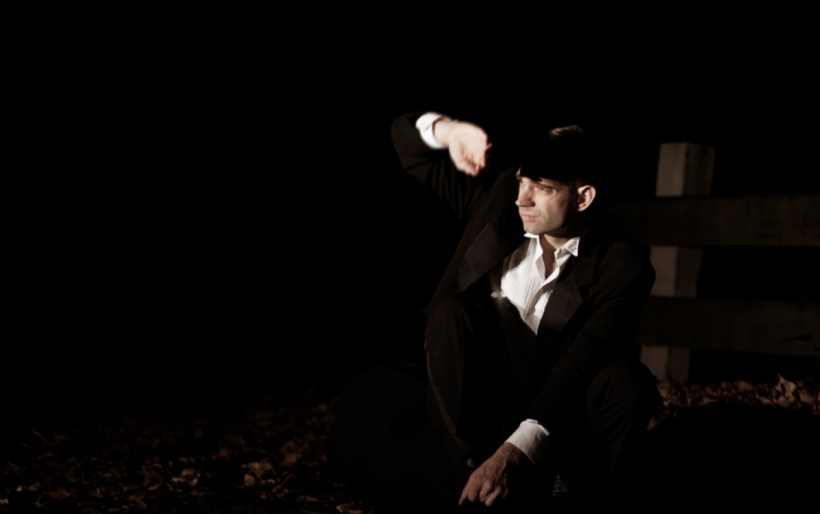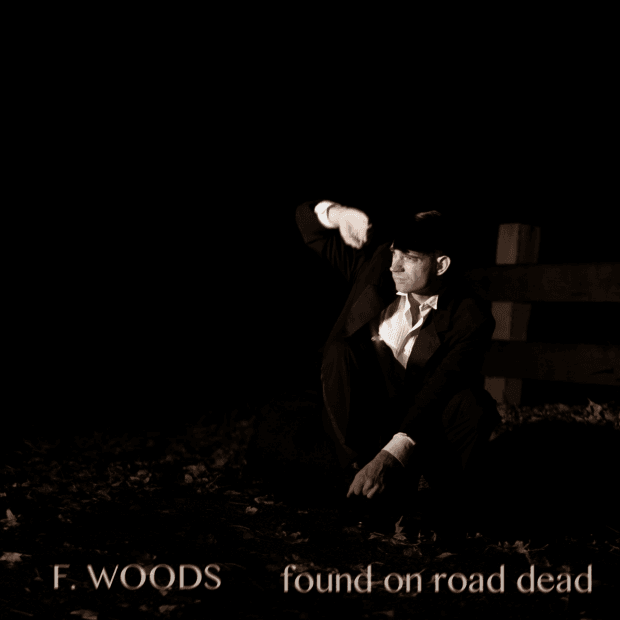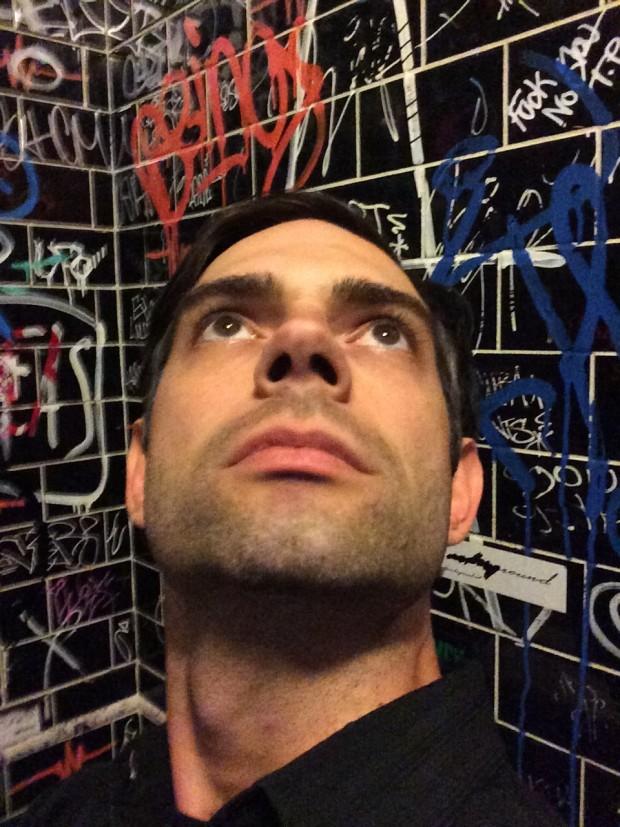
F. Woods’ Found on Road Dead | photo courtesy of the artist
Mixtape Master: Get to know Philly’s F. Woods before he opens for Dead Milkmen at Laurel Hill
Make sure you arrive early to the sold-out Dead Milkmen show at Laurel Hill Cemetery this Friday night, because you’ll see a mixtape master at work. F. Woods is known around the Philly scene for being a founding member of Mercury Radio Theater, the zany and subversive troupe informed by eastern European folk sounds and early 20th century radio plays.
Woods also played in Farquar Muckenfuss, a comical and surf-rooted band that made the rounds in in the late 90s Philly punk scene.
As Woods said when I caught up with him by phone earlier this month, it’s pretty simple – he likes a lot of music, and he wants to play it all. His first-ever solo album, Found On Road Dead, came out via Bandcamp last November, and it’s a varied and eclectic set. There’s a bit of surf, a bit of math rock complexity, some tunes reminiscent of the airy pop production of the pre-rock-and-roll 40s and 50s.
It’s basically a collection of stuff that together feels very unified, even though the songs are individually distinct. In that sense, it reminds me a lot of a Tarantino soundtrack, or a really good compilation. Below, read my interview with Woods about his musical origins and outlook.
The Key: We first crossed paths in your session with Mercury Radio Theater, and I wanted to start by talking with you about that and your role in that band versus doing stuff solo. In that band, how much does Buddy [Mercury, bandleader] orchestrate, and how much input was there from the other members, yourself included?
F. Woods: Actually he and I have known each other for years. We’ve been really tight since basically the 90’s. So, we grew up playing guitar together and learning how to be better and challenging each other. The natural order is that we’ll sit down together, just the two of us. Often in the past couple of years, he’ll come up with a theme on guitar or just in his head, and we’ll sit down and we’ll hack it out. We’ll arrange the song together and it’ll be super raw, but then we will take it to practice and present it to the rest of the band and just get everybody’s gears turning. We try to figure out, “Alright where does everybody fit in this song?”
Our fourth album is coming out this October, and it was very much a group project. It was kind of weird too, because we went from our third album, Kilroy, primarily being a three-piece wherein I did very little of the writing — I was living out of Philly so I wasn’t really playing in Mercury, but I did a lot of stuff like second guitars and had feedback. Once we decided to start playing fewer shows, but putting all of our weight behind [the shows we did play] we figured, why not bring all the layers on to stage? So, we pretty much went from three to eight people; in the span of about a year we just exploded with more band members. This album was a lot more inclusive with the rest of the people’s opinions. We’ll start with a seed then we’ll take it to our drummer Joe Getz and he’ll put the Joe sauce all over it, and from there it’ll branch out.

F. Woods’ Found on Road Dead | photo courtesy of the artist
TK: When you put out Found on Road Dead last fall, it seems like that was probably being made around the same time as when you were trying to record this next Mercury record. What was the genesis for you wanting to do a whole body of work by yourself?
FW: I’ve always wanted to do solo stuff. I’ve always been a composer as far as when I write a song I’ll write all the parts in my head. Or as I’m writing my guitar part or the body of the song, I’ll have bass in mind, I’ll have keyboards in mind and stuff like that. Whereas Mercury is more of a collaboration, and I’ll have to kind of stop my brain from thinking past my own guitar. The band has a mind of its own, and I respect and enjoy that. It’s great working in a collaborative, but at the same time I come up with my own stuff and I tend to want to control it.
For this upcoming show I actually decided to name the band, “The Surviving Members” because I never really play with the same people more than once. I’ve been playing with Joe for years and he’s been my steady drummer but also he’s a session guy so if he’s not available for a show then I have to think of something else. This album was tough because I started in 2011 in November and I had to put it on hold for a number of reasons. Half of the album was unwritten when I went into the studio. My friend Jason has a studio in New York and we went in to hack it out together, but he’s a location sound engineer so he would get work the night before a recording session and he would have to take it. So, I ended up folding that and putting it on a shelf because I was just hemorrhaging money up there and surviving.
So I came back to Philly, and to put it very very lightly – a friend of mine died and I was in a very dark place so I decided not to do anything for a couple of years. In the fall of 2014, I decided to unearth the sessions. I scrapped half of the songs, I finished a couple of other ones.
And then, our vibraphone player in Mercury, Tom Scheponik, he a mastering engineer at DiscMakers. I asked him to track my album, mix and master it for me, and he was on board. And he collaborated a lot. Every day when we scheduled a session, we’d just chat, “What does this song need?” And suddenly it would change from some simple folky fingerpicking song that was supposed to be very bare bones. This actually was my attempt at a folk album and it turned out to be a little bit more layered than that.

F. Woods | photo courtesy of the artist
TK: Stylistically and sonically it kind of feels like, it might be an obvious comparison, but a Tarantino soundtrack. As far as the sound and the approach stylewise, how did you come to create this?”
FW: I want to do every style, I want to play every genre. I have a list a mile long of bands I want to start, but I never will because I’m not Mike Patton. There are people out there who have several projects, and I’ve tried that but I just don’t have that kind of focus. I would rather keep my life simple because all of the components of my life are very complex. So with that said, yeah I do want to play a simple surf-rock song. I came up that way, I learned how to play guitar by listening to Dick Dale, The Ventures, Chet Atkins, and Les Paul.
I’m in a band called Farquar Muckenfuss. In the mid-nineties, actually Dandrew who is the bass player in The Dead Milkmen, he and I are in that band. We rarely play because of scheduling and stuff. So we started out as a surf band, and we had a very difficult time getting shows, but it gave us a different perspective. It wasn’t three-chord punk rock. It was whatever it turned out to be, we just allowed ourselves to play whatever we felt like playing, and if people liked it, awesome. If they didn’t…ok, that’s fine, we’ll just move on.
One of my favorite bands is Mr. Bungle, where if you listen to any one of their albums, they jump from genre to genre. They go all around the world in a forty- or sixty-minute album, its cinematic. It’s funny you should mention Tarantino soundtracks, because I wanted people to come up with visuals on their own, I didn’t want it to be so blatant. I just want [people] to listen to the music and come up with their own situation. If it puts you in the Southwest, then great. If it puts you in outer space, then also great.
TK: I like the idea of it your music being rooted in punk but not three-chord punk, fast loud hard…that is certainly punk, but it stretches so far beyond that. The Minutemen were widely regarded as punk, and some of it was three-chord stuff, yes, but some was a lot more complex. Flipper, same deal, but I don’t think many people would challenge that they’re a punk band. It’s interesting that, when you were saying that Farquar Muckenfuss was having a hard time booking gigs because of that eclectic vibe.
FW: I think a lot of the time people didn’t know what to do with us. They were like, ‘Well we’re putting together a punk show. Are these guys punk?’ ‘Well, I don’t know.’ We got a lot of that and we enjoyed that. The three of us would look around at each other before a show thinking, well how are they going to receive us this time? We would get sandqwiched between metal bands, we would get sandwiched between emo bands. But we were also young kids, we’d have a tough time getting a show at a bar. But over time, we’d get people who respected what we were doing. Even if they sometimes didn’t like it, we’d get ‘hey, I respect this.’ We did clear a room once or twice.
TK: How do you plan on approaching this record as a live band? Is it just you or is it a band?
FW: So, we finished the record in November and my main concern was when I finally form a band, how do I approach this? That was just as much a question to me as it was to anyone. It wasn’t a collaborative effort. It was in the studio, but we weren’t practicing in a rehearsal space for months. It was just me coming up with parts. I would do bass for one day with Tom. And then if we weren’t feeling it or if someone was in the studio next door making noise we would do something else, or we would call it a day. It was just a matter of “Let’s finish the album.” It took us a long time to record, and at that point I was really depressed. I wrote a song about my friend. I missed him and I still do. I just needed to finish the album, so I wasn’t always considering who was going to be on what instrument.
For the album release show I got a lot of my bandmates and some old friends from bands around town and we fleshed out the music. I basically sat down with each musician and said, ‘Hey, you’re on bass for this show. Here’s how the bass goes.’ Joe the drummer already knew all of the drum lines. So, we basically had to introduce people one at a time, and finally we did dress rehearsal style then we played the show; after that I didn’t play for a long time.
TK: How did you get connected with the Dead Milkmen gig a Laurel Hill?
FW: In the spring, Dan from the Milkmen was at practice and he played the record for the band – he’s on the record, he did backups and choirs with me — and they liked it, so they invited me to play this show, and that was great, because I’ve been trying to go for quality over quantity as far as booking shows. It’s hard to expect your bandmates to practice five or six times before a show and then play the show in front of twenty people.
I wasn’t really interested in doing that. I was trying to figure out how to get in front of more people so it’s more worth [the band’s] while so we all get paid…because we’re not kids. We all have bills, careers, and some of us have kids. So, I wanted to do the necessary layers but strip everything else out. No horns this time, one guitar, one organ, one bass, and one drummer. So that’s the incarnation of this band, and last night we had a great rehearsal. We are gelling as a band, and I feel like these guys are going to stick with it.
F. Woods opens for The Dead Milkmen at Laurel Hill Cemetery on Friday, September 30th. For more information on the show, go here.